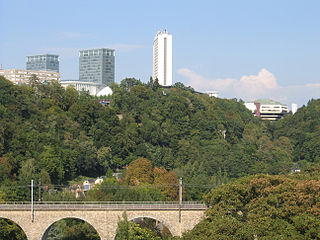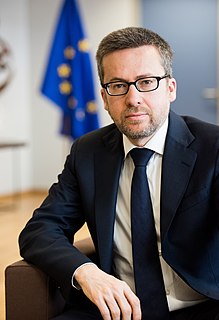
Eurostat is a Directorate-General of the European Commission located in Luxembourg. Its main responsibilities are to provide statistical information to the institutions of the European Union (EU) and to promote the harmonisation of statistical methods across its member states and candidates for accession as well as EFTA countries. The organisations in the different countries that cooperate with Eurostat are summarised under the concept of the European Statistical System.

The secretariat of the European Parliament is the administrative body of the European Parliament headed by a Secretary-General. It is based in the Kirchberg district of Luxembourg City and around the Brussels-Luxembourg Station in Brussels and employs 4000 officials.

Directorate General for Communications Networks, Content and Technology or "DG Connect" is a Directorate-General of the European Commission. DG Connect is responsible for managing the Digital Agenda.

The Joint Research Centre (JRC) is the European Commission's science and knowledge service which employs scientists to carry out research in order to provide independent scientific advice and support to EU policy. The JRC is a Directorate-General of the European Commission under the responsibility of Tibor Navracsics, Commissioner for Education, Culture, Youth & Sport. The current Director General of the JRC is Vladimír Šucha. Its Board of Governors assists and advises the Director-General on matters relating to the role and the scientific, technical and financial management of the JRC.

The Directorate-General for Environment is a Directorate-General of the European Commission, responsible for the European Union policy area of the environment.
The Directorate-General for the External Relations was a Directorate-General of the European Commission, responsible for the external policy. The DG was merged into the European External Action Service in 2010, then headed by High Representative Catherine Ashton.

The Directorate-General for Mobility and Transport is a Directorate-General of the European Commission responsible for transport within the European Union.
The Executive Agency for Small and Medium-sized Enterprises (EASME) is an Executive Agency of the European Commission. EASME was founded in 2003 as the Intelligent Energy Executive Agency (IEEA) and was renamed the European Agency for Competitiveness and Innovation (EACI) in 2007, finally becoming EASME in 2014. It is responsible for managing specific programmes in the fields of energy, the environment, and business support. Its goal is to promote sustainable development while improving the competitiveness of European industries. While the Agency has its own legal identity, it reports to several Directorates-General of the European Commission, which remain responsible for programming and evaluation of the programmes.

The Directorate-General for International Cooperation and Development is one of the departments of the European Commission. It operates under the authority of the European Commissioner for International Cooperation & Development, Neven Mimica.
The Commissioner for Research, Innovation and Science is a portfolio within the European Commission. The current commissioner is Carlos Moedas (EPP).
The Enterprise Europe Network provides support for Small and Medium-sized Enterprises (SMEs) with international ambitions. Co-funded by the European Union's COSME and Horizon 2020 programmes, the Network's aim is to help businesses innovate and grow internationally.
The Innovation and Networks Executive Agency (INEA) is an executive agency established by the European Commission in order to run the Connecting Europe Facility and parts of Horizon 2020, with legacy programmes of the TEN-T programme and the Marco Polo programme. It superseded the Trans-European Transport Network Executive Agency on 31 December 2013.

The Directorate-General for Migration and Home Affairs is a Directorate-General of the European Commission. The role of the body is to ensure the EU's security, to build a common EU migration and asylum policy, and to promote dialogue and cooperation with non-EU countries. Thereby, it contributes to the Area of freedom, security and justice (AFSJ).
Horizon is an online-only, open-access magazine covering research and innovation, published in Brussels since 2013 by the European Commission. It covers a wide range of topics, including agriculture, energy, environment, frontier research, health, ICT, industry, policy, science in society, security, social sciences, space and transport.
The European Innovation Council (EIC) is a proposal of a council with the mission of supporting the commercialization of technologies in the European Union. In its latest form, the concept has been put forth by the EU Research Commissioner Carlos Moedas in mid-2015. Similar proposals were presented over the years, including by Hans Wigzell in 2002, and by the European Association of Research and Technology Organisation (EARTO) in 2010.
The Graphene Flagship is the EU’s biggest research initiative. With a budget of €1 billion, it represents a new form of joint, coordinated research initiative on an unprecedented scale. Through a combined academic-industrial consortium, the research effort covers the entire value chain, from materials production to components and system integration, and targets a number of specific goals that exploit the unique properties of graphene. There are some critics of this and similar initiatives, arguing that excessive funding of graphene-related research and innovation is disproportional to estimates of industrial potential.
Cascade Funding, also known as Financial Support for Third Parties (FSTP), is a European Commission mechanism to distribute public funding in order to assist beneficiaries, such as start-ups, scale-ups, SME and/or mid-caps, in the uptake or development of digital innovation.
The Research Executive Agency (REA) is an executive agency established by the European Commission in order to manage specific Community activities in the field of research and innovation. The REA's mission is to assist the Commission in achieving the objectives of the Research Framework Programmes and the EU strategies to foster growth through research and innovation. The agency started operating in 2009.

The Scientific Advice Mechanism is a service within the European Commission which provides independent science advice directly to European Commissioners to inform their decision-making. The Mechanism consists of two parts: the Group of Chief Scientific Advisors, an expert group consisting of up to seven leading scientists, and SAPEA, a consortium of five European Academy Networks collectively representing around 100 academies and learned societies across Europe.










